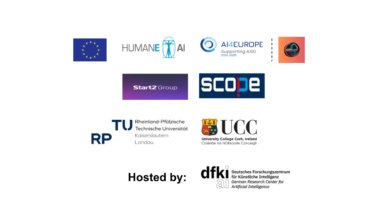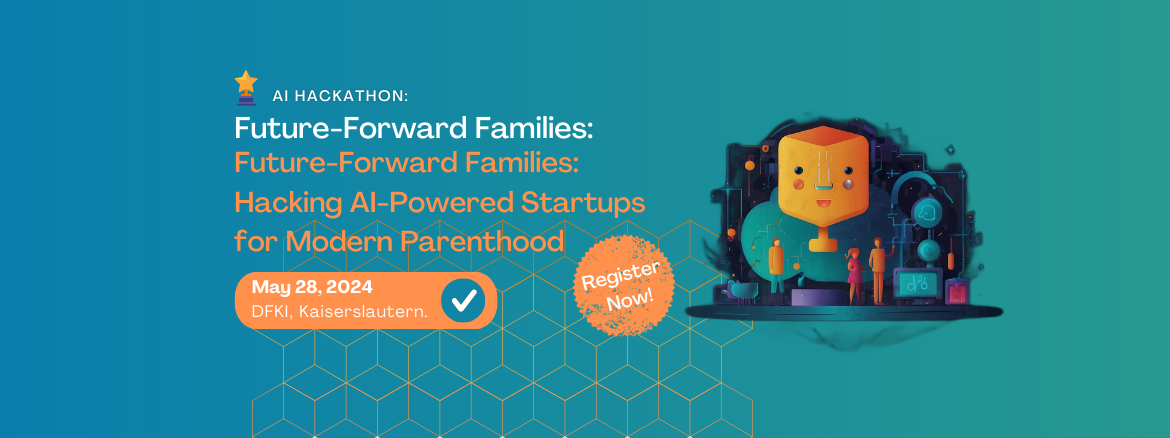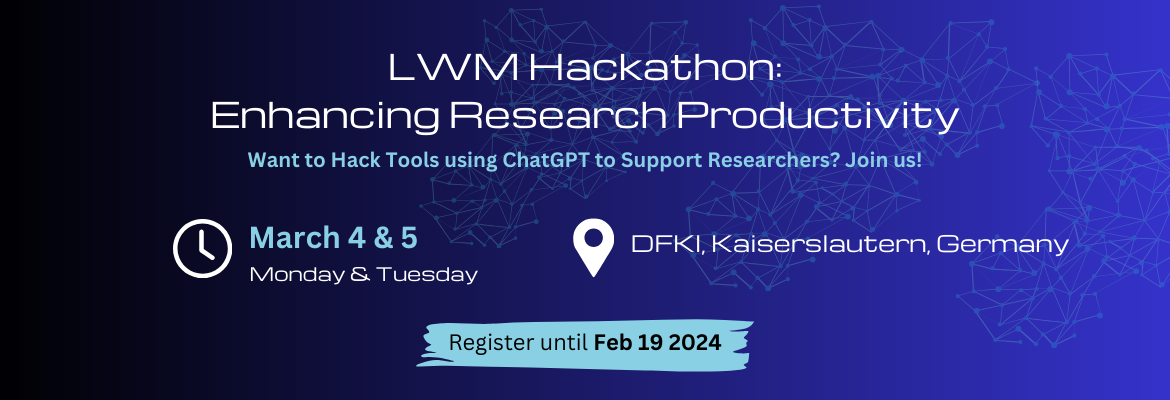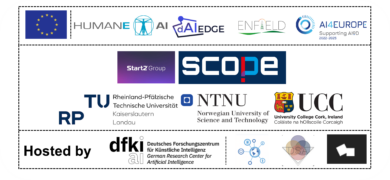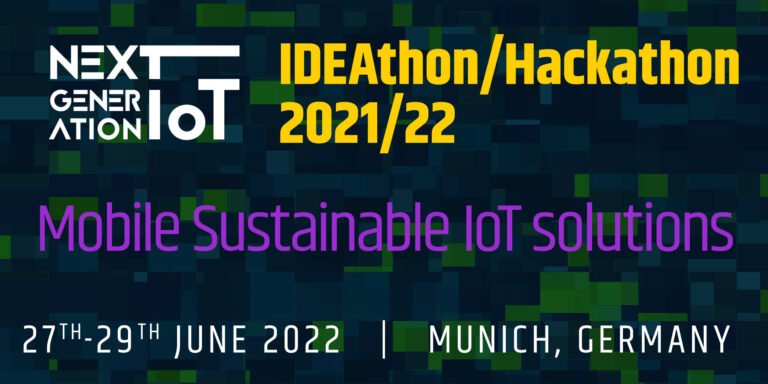Summary
Attendance mode: in-person - remote participation is not supported - Language: English.
Date: Tue, May 28 2024
Location: Kaiserslautern, Germany (DFKI)
Fees: Free participation
Registration: Register https://forms.gle/GjCd576ZwntV41zf6 by May 8th 2024 extended to May 14th 2024 (We'd love to have you :) We have a couple of spots left, you can register & we'll confirm within 24 hours if you have a spot)
Publicity: By attending the event, you consent to the capturing and sharing of photos and videos taken during the event, both online and offline. The content is mainly shared through Humane AI social media accounts (Linkedin, Facebook, X)
Join us for a one-day Hackathon empowering parents to harness AI and cutting-edge tech for streamlined family life. We'll demonstrate how modern AI tools can empower busy individuals (such as stay-at-home parents and new expats) to seize business opportunities right from the comfort of their homes. No prior programming or AI tool experience is required!
🎯 Goal 1: Discover How AI Boosts Parenting Efficiency: Uncover the secrets of AI and how it can revolutionize your daily parental duties, making life smoother and more manageable.
🚀 Goal 2: Ignite Startup Innovation in Family Solutions: Fuel your entrepreneurial spirit as we encourage rapid prototyping and the launch of new startups focused on family-oriented solutions powered by AI tools.
🎯🎯 Who Should Attend?🎯🎯 This event is tailored for parents seeking innovative solutions for family life and/or tech enthusiasts eager to dive into the world of AI. Others are also welcomed.
Topics of Interest
The proposed solutions should tackle one or more of the following domains:
-
- Smart Parenting Tools: Explore AI-powered solutions tailored to simplify everyday parenting tasks.
- Efficient Scheduling: Learn how AI can optimize family schedules for better time management.
- Personalized Assistance: Discover how AI technologies provide personalized support for each family member.
- Quality Family Time: Enhance family bonding with AI-enabled activities and communication tools.
- Innovative Education: Explore the latest educational technologies for children, powered by AI.
- Health and Wellness: Utilize AI tools to promote healthier lifestyles and well-being for the whole family.
- Home Automation: Experience the convenience of AI-driven smart home devices for a more efficient household.
- Entrepreneurial Empowerment: Receive guidance on leveraging AI for business ideas to accelerate entrepreneurship ventures for families.
Participants can come up with their ideas and describe creative problems that they want to tackle in the hackathon event.
Expected Output
The teams can use any AI-powered tools to create mockups of their startups. We highly recommend using ChatGPT. Teams should create their accounts before the event. They should also use at least one tool presented in the workshop morning tutorials.
Each team should submit the following items:
- Startup name + 300-500 words description of their idea
- Mock-up of their startup solving a family need using AI tools.
- Give a talk about their solution
The outputs will potentially be published via the AI on Demand platform.
All attendees get a certificate of participation. Additionally, there will be 3 winning teams.
Tentative Agenda and Material
We reserve the right to update the event agenda. Lunch is provided.
| Time |
Agenda Item (Tue 28/5 11:30 - 17:30) |
| 11:30 |
Registration + prepping flash intros |
| 12:00 |
Introduction |
| 12:10 |
Flash introductions (introduce yourself in 30 secs) |
| 12:30 |
Talk 1 (Hend Eldamaty): Family guru (how to use AI for parents) |
| 13:00 |
Talk 2 (Stephanie LeBlanc-Godfrey): Mother AI |
| 13:30 |
Lunch break |
| 14:30 |
Talk 3 (Asif Shahriar): AI in Education |
| 15:00 |
Talk 4 (M. Tahasunl Ibrahim): Ethics in AI |
| 15:15 |
Intro for startup workshop & team distribution |
| 15:30 |
Coffee break |
| 16:00 |
Group activity (workshop) |
| 16:30 |
Pitching ideas & team presentations |
| 17:00 |
Talk 5 (Paul Lukowicz): Future of AI |
| 17:30 |
Closing |
Speakers
- Stephanie LeBlanc-Godfrey: CEO/Founder Mother AI | Global Head of Inclusion for WOC Google | Think50 Radar '24 | Empower Working Parents to Learn AI Skills
- Hend ElDamaty: AI4Moms initiative- AI Copilot trainer-Microsoft competition winning AI 4 parenting App
- Asif Shahriar: PhD Candidate and Researcher in eLearning, specialising in Human-Computer Interaction. Expertise includes the design and implementation of chatbots in educational settings
- M. Tahasanul Ibrahim: Research Fellow in computer vision, machine learning, and data enhancement. He holds a Master of Science in Semi-Supervised Machine Learning Models and is currently pursuing a Doctor of Philosophy in Computer Vision and Data Enhancement.
- Paul Lukowicz: Professor of AI University of Kaiserslautern & Scientific Director in the German Center for Artificial Intelligence (DFKI)
Publicity
By attending the event, you consent to the capturing and sharing of photos and videos taken during the event, both online and offline. The content is shared through Humane AI social media accounts (Linkedin, Facebook, X)
Tag us to re-share your posts: @humaneainet
Registration
You can come with your team, sign up alone and we assign you to a team or compete solo. The maximum size of a team is 3 members.
Registration form: https://forms.gle/GjCd576ZwntV41zf6
Registration deadline: Rolling deadline May 8th 2024 extended to May 14th 2024
We'd love to have you :) We have a couple of spots left, you can register & we'll confirm within 24 hours if you have a spot.
Notifications of Acceptance or Rejection
- Applied until May 14th? Notification email latest by
May 10, 2024 May 16, 2024.
- Applied after May 14th? Notification email after 24 hours (business days).
Please ensure that the email address provided in your application is accurate and regularly checked. We appreciate your patience and understanding
VISA Requests
If you need a VISA support letter, please email Siobhan O'Neill <siobhan.oneill[at]insight-centre.org> to expedite the process. Please include the following information:
- The full name like the passport
- Home Address (will be used to address the letter)
Please note that VISA support letters are only possible if you have successfully registered for the event and we have sent you an acceptance email. Please expect around 3 business days for processing time.
Planning your Trip
Event Location
DFKI GmbH (German Centre for Artificial Intelligence)
Address: Trippstadter Str. 122, 67663, Kaiserslautern, Germany
Google pin: https://maps.app.goo.gl/5NReSf7kc7tURi789
Website: https://www.dfki.de/web
Arriving to Kaiserslautern
Arriving by Train
The closest train station is called "Kaiserslautern HBF". You can check train connections and buy the tickets from the Deutsche Bahn website or mobile application: www.bahn.de
Arriving by Plane
The closest civil airport is in Frankfurt am Main. From there, there are two possibilities of transport:
- By train - there are multiple connections throughout the day, however, usually change is necessary. The train station is located next to the airport (Frankfurt Flughafen) and it is possible to get there without walking outside of the buildings. The prices range from 15 to 40 EUR. The easiest way to manage your ride is with a DB app - it is possible to buy tickets there, get updates about routes etc.
- By bus - for example Flixbus offers direct connection from Frankfurt airport to the Kaiserslautern bus station. Prices range from 8 to 15 euros. However, there are only a few connections throughout the day.
Getting Around in Kaiserslautern
The closest bus stop is: Frauenhofer Centrum. Bus lines coming to the DFKI are 105, 115 and 116. You can also go to the university and then walk to DFKI, it takes about 5-10 min.
The company taking care of the buses is SWK-KL. You can check the connection here: https://www.swk-kl.de/produkte-services/busverkehr/busfahrplan, or download an app myVRN-APP to buy the tickets and check the connections.
Accommodation
Participants should self-organize their accommodation. Below are some close-by options.
Hotels
1/ Design Hotel Zollamt (the closest one to the hackathon site) (11 mins walk to DFKI) (link)
2/ Astra Garni Hotel (21 mins walk to DFKI) (link)
3/ B&B Hotel (near the train station) (27 mins walk to DFKI)(link)
4/ Art Hotel Lauterbach (bus station across the street) (35 mins walk to DFKI) (link)
Boarding houses
5/ Dietrich Felgner (19 mins walk to DFKI) (link)
6/ Lutrina-Gästehaus (26 mins walk to DFKI) (link)
Have questions?
Contact Siobhan O'Neill <siobhan.oneill[at]insight-centre.org>
Organizers
- Hend Eldamaty, AI4Moms initiative
- Passant Elagroudy, DFKI GmbH & RPTU Kaiserslautern
- Jakob Karolus, DFKI GmbH & RPTU Kaiserslautern.
- Siobhan O'Neill, Insight SFI Research Centre for Data Analytics, University College Cork.
- Joanna Sorysz, DFKI GmbH & RPTU Kaiserslautern.
- Paul Lukowicz, DFKI GmbH & RPTU Kaiserslautern
This event is organized as a collaboration between the #AI4Moms initiative and the European Union’s Horizon 2020 research and innovation programme through the European AI Networks of Excellence: Humane AI Net in addition to the AI4Europe project. It is also supported by Start2 Group and SCOPE as well as the following universities: RPTU Kaiserslautern-Landau and UCC. The event is hosted by the German Research Center for Artificial Intelligence (DFKI) (Embedded Intelligence department).
